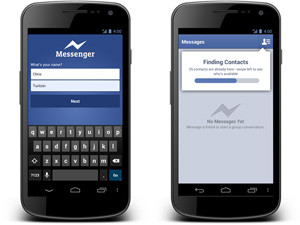
On the back of rumours that Facebook has been seeking to acquire popular cross-platform messaging service, Whatsapp, the world's largest social network has announced a new feature that makes its own messaging service available for non-Facebook users.
The new feature is initially being rolled out to Android users in SA, Australia, India, Indonesia and Venezuela. Users can now create a Facebook Messenger account with just their name and phone number. The service is ad-free and free of charge, and is expected to be expanded to iOS and feature phones in the near future - showing Facebook's intention to dominate the mobile messaging space.
Facebook mobile product manager Peter Deng officially announced the new feature at the LeWeb conference yesterday. He said: "The SMS protocol has been around for 20 years. It's designed for these old phones, and they don't take advantage of the location features, the touch-screen, the picture-taking that today's phones have and that's why we invested in it."
With the initial release of the service in emerging markets, it has also been noted that the Messenger service could act as an entry point into the Facebook ecosystem for those users who are yet to create their own accounts. Deng alluded to this when he said the service "could lead to other parts of the Facebook product" with the ability to post status messages or share photos and albums.
Mobile focus
It is widely known that Facebook as a company has shifted to a mobile-first strategy. In the run-up to its IPO, it was repeatedly noted that mobile was a major stumbling block for the social network and finding effective ways to monetise it is a top priority.
Facebook recently revealed that over 102 million users are accessing the social network from their mobile phones only - a 23% increase from March. The sequential quarterly growth of daily active users (DAUs) from 526 million to 552 million is almost solely driven by mobile.
Facebook noted: "During the second quarter of 2012, the number of DAUs using personal computers was essentially flat, and declined modestly in certain key markets such as the US and Europe, while mobile DAUs continued to increase."
Facebook CEO and founder Mark Zuckerberg has said mobile is a key focus area for Facebook looking forward: "Mobile is a huge opportunity for Facebook. On average, mobile users are around 20% more likely to use Facebook on any given day.
In October last year, Facebook released its standalone Messenger application for BlackBerry, Android and iOS. Like other instant messaging services, the app allows users to send messages to individuals or groups. Users can also see who is online (on mobile or Web) and shows read receipts and when someone is typing a message (like Whatsapp and BBM). Apart from the data connection fee, the service is essentially free.
Highly competitive
The post-SMS mobile messaging space has become increasingly competitive with even Samsung and Apple releasing their own services (ChatOn and iMessage respectively). Whatsapp also recently exceeded 100 million downloads on Google Play, and has consistently been the top paid app on iOS. In August, Whatsapp reported that it was sending and receiving over 10 billion messages per day.
Amid the rumours of Facebook looking to buy Whatsapp, it was noted that the social network has a pattern of seeking to acquire services that have significant traction in spaces it plans to expand into, Instagram being a prime example. Shortly after the announcement of the acquisition, Facebook released its own Facebook Camera standalone app for taking and sharing photos.
In SA, services that offer cheap alternatives to SMS have been thriving. The 2012 Mobility Report by World Wide Worx found that BlackBerry Messenger usage has increased by 467% since 2010, with Whatsapp coming up from 0% to 26% ? taking over a quarter of the market. Local mobile social network Mxit is used by 23% of South African cellphone users.
World Wide Worx MD Arthur Goldstuck said at the release of the Mobility 2012 report that 38% of all cellphone users in SA use Facebook (showing 73% growth since 2010) and it is the primary means of instant messaging in the local market.
Share